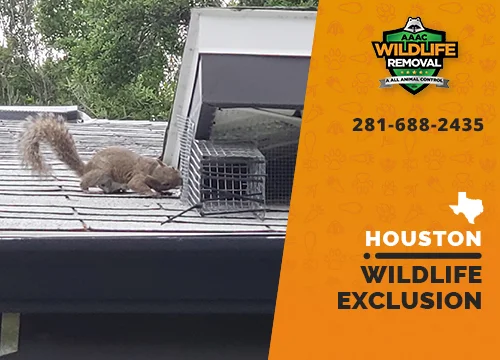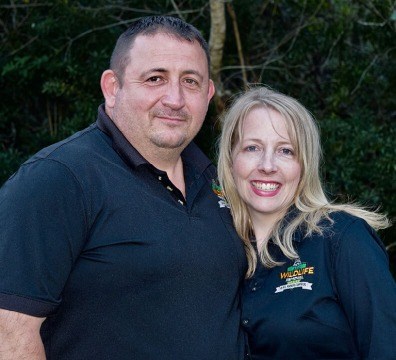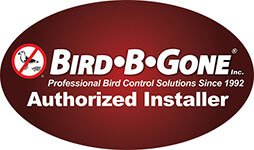
What is Wildlife Exclusion?
Exclusion refers to sealing any animal entry points in your home or place of business that prevents them from returning inside. It is simpler than trying to exclude wildlife on your own.
AAAC Wildlife Exclusion Services offers humane exclusion services for any wildlife that may pose a threat to your home or business. We are highly trained to do exclusion safely and correctly.
We can help if there are animals living underneath your house or inside your walls. We can seal all entry points for animals that we find. This includes holes in floors and cement cracks around pipes.
How We Conduct Wildlife Control and Exclusion Services
Nuisance wildlife may have somehow managed to enter your home or business, and you are now thinking about trapping and getting rid of them. But, just trapping them won’t solve the problem. While you might be able to exterminate the initial infestation, without wildlife exclusion services you will just wait until the next set of critters moves in. Here are some steps to stop the infestation cycle with animal exclusion techniques.
Find and seal all entry points:
First, we find all of the access points that animals use. This could be holes in floors or cement cracks that surround pipes or any other way an animal might get into your home. This includes holes in roof shingles, soffits, eaves, fascia, and roof flashing as well. We then block all access points. In some cases, we do this by drilling rubber grommets (or metal grommets) on top of the hole. This seals it tight. In other cases, we can use wire mesh to plug cover the holes. We will then cover the hole with weatherproof material to protect it from rain, snow, wind, and other elements. Lastly, we need to wait and see if there are any other openings that could lead animals inside your building before sealing them off as well.
Exclude wildlife using a trap or one-way door
The main entry point that wild animals use in order to enter and exit your property or business is often identified by top pest control companies. To properly exterminate nuisance wildlife, we purposely do not seal the hole. Once we’ve identified it, we can use either a live trap or a one-way door.

One-way doors: One-way doors are a great option for people who don’t want to kill an animal. These doors are designed to allow animals to enter, but not leave. You will need to leave a small opening on the door, just enough so that the animal can fit through it, but is not able to turn around and get out. Then, we place some bait on the other side of the opening and wait until the animal enters. They can’t turn around or leave the hole from this side once they’ve headed towards the bait.

Live traps: To use a live trap, place traps near any openings that animals could use to get in. We can lure the animals into our trap by placing them near these openings. Once the animal enters the trap, it’s caught!. A cage trap may be necessary if the wildlife being trapped is larger like a raccoon or an opossum. It is a wire mesh trapping device that keeps the animal inside. Then technicians from our wildlife removal firm will take it out of your home.
Popular Access Points for Animal Entry
To avoid future wildlife infestations, any professional wildlife pest management service must inspect every possible entry point that rodents or other wildlife may use to enter your home. AAAC Wildlife Removal is quite thorough. But, here is a quick guide of the most commonly used access points by animals to get inside your house.

Ridge Vents
Bats enter attics by way of the ridge vent. It is a strip of metal that runs along the roof’s edge. Ridge Guard can be used to close any openings on the vent side. Once the vents are sealed, we can do a complete roof repair to make sure your house is animal-proof. We can help you determine if the vents on your roof are allowing critters inside.

Gable Vents
Raccoons, squirrels, or other animals often enter homes through the gable ventilations. These vents can be screened or may have a small flap that is easily removed from the underside by an animal’s paw. We can secure these vents with a wire mesh. This allows for airflow but does not allow animals to enter. We can also secure the vent flaps and replace any rotted wood that may have allowed an opening for critters to enter in the first place.

Dryer Vents
Dryer vents can be a common entryway for rodents or birds. Rodents can often chew through dryer vents to get into your home, especially if they’re migrating between buildings in search of food or shelter. The dryer vents allow airflow through and keep the birds alive. This is why it’s so important to cover these vents with metal mesh and seal all openings.
Birds like dryer vents because of the warm airflow moving through them. You might notice an increase in your electricity costs as birds use the dryer vents as access for their nesting areas. Common vent guards are the best way to prevent this.

Soffit
Raccoons and squirrels love to get inside your attic through a damaged soffit. A proper wildlife removal service operator will replace any rotted wood that is allowing wildlife entry and then secure the openings using closures or metal mesh. Your soffit is guaranteed to look new and your rodent family gone.

Fascia
Wild animals also love the fascia on your house. If your roof had gutters, the fascia would cover the gutter under your roof. It is a board that covers the gap between your roof edge and your gutters. We cover all gaps with metal mesh to prevent wildlife access. After that, we replace and remove any rotten wood and install a metal cover that blocks water from flowing freely.

Eaves
Raccoons love to crawl under your home’s eaves. Eaves are the areas where the roof meets the sides of your home. Our technicians can either place the metal mesh in these areas to exclude wildlife, or we can install special Eaves Guards that will stop animals from getting back in.
The Chimney
One of the most common ways that animals enter a home is through the chimney. We have chimney caps that can prevent animals from getting into a home. If they are already inside, we can also remove the chimney liners and replace them once the pest is removed.
The chimney is a cozy place for bats, squirrels, and other animals. Due to venting and fire hazards, this is often a difficult access point to inspect. To find out the animal’s hiding place, we often use flameless heat detection cameras. We also have the option to just remove the old liner or cap and replace it.

Cracks in the foundation
Foundation cracks can be a favourite entry point for rodents. We can fill foundation cracks with cement filler compounds to keep rodents out of your home. This type of repair is not only animal-proof, but it also makes your home look better from the outside as well!

Exposed pipes
All species of rodents just love to get inside the walls of your home using exposed pipes. The best prevention for this is to secure any gaps with metal mesh, and then cover up pipe openings with a cap that prevents animals from entering again while allowing air to freely move through all spaces in your home.
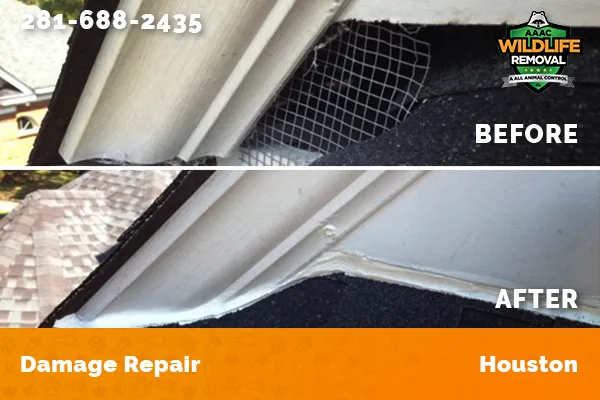
Wildlife Damage Repair Service
Once your wildlife exclusion is complete, it’s important to repair the damage that rodents, squirrels, bats, birds, mice, rats, or other pests may have caused. Many wild animals will make their entryway into your home bigger by gnawing it with their teeth and by scratching with their claws. This can leave some unsightly damage.
Our wildlife damage repair services rank high among pest control professionals. We have the skills and experience required to repair any form of wildlife damage. Our contractors are capable of replacing damaged drywall or insulation with other building materials either on their own or in teams. The contractors have the skills to quickly and efficiently repair your home to minimize future animal damage.
Learn more about Wildlife Damage Repair
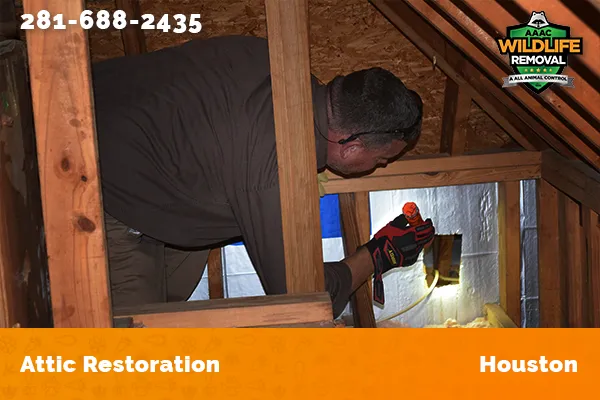
Attic Restoration
A terrible infestation may have contaminated your attic with urine, blood, and feces. This can cause a horrible stench and create a perfect environment for mold growth. Our pest control specialists will replace any contaminated insulation with fresh materials that have been treated against moisture and odor. Our pest control specialists can also replace insulation that has been chewed or torn by rodents such as rats, mice, and squirrels. We use heavy-duty staples to secure new material to your attic floor. Our attic restoration services will make your attic look brand new!
Learn more about Attic Restoration
Wild Animal Pest Control
Exclusion is a humane approach to pest control. Wildlife can be humanely caught or encouraged to leave. They are then prevented from returning once the openings have been sealed. This article offers some insights on how professional wildlife exclusion companies can help solve problems caused by wild animals in your home. AAAC Wildlife Removal is available for expert advice on wildlife exclusion!

